This article was co-authored by Marc Kayem, MD. Dr. Marc Kayem is a board certified Otolaryngologist and Facial Plastic Surgeon based in Beverly Hills, California. He practices and specializes in cosmetic services and sleep-related disorders. He received his Doctorate in Medicine from the University of Ottawa, is board certified by the American Board of Otolaryngology, and is a Fellow of the Royal College of Surgeons of Canada.
There are 21 references cited in this article, which can be found at the bottom of the page.
This article has been viewed 39,798 times.
Having trouble sleeping? Do you wake up groggy and grumpy in the morning, with very little energy? Many things can keep a person up at night, from worry and depression to distractions like television and the internet. Fear not, though. With some changes in how and where you sleep, and some alterations to your lifestyle, sleeplessness can usually be cured.
Steps
Getting Through the Day
-
1Caffeinate, in moderation. Didn't sleep a wink last night? Whether you pulled an all-nighter or are suffering from insomnia, your first idea in the morning may be to get some strong coffee to help you power through the day. This is OK. Just don't over do it.[1]
- Caffeine from coffee, tea, or energy drinks will give you a real, short-term energy boost. It will make you feel more awake and alert.
- Caffeine counteracts the build-up of sleep hormones in your brain, but only to a point. You won't get much benefit after the second or third cup of coffee. Instead, you'll get jittery.
- Try not to drink caffeine after about 4 pm, as it can interfere with your sleep later that night.
-
2Eat and drink wisely. Your body on little sleep will crave simple carbs. Don't listen to it! Simple carbohydrates and sugars will give you a quick boost followed by an insulin crash, making you feel sleepy later on.[2] [3]
- Instead, try to eat whole grains, protein, and some fruit. Aim for foods that give a steady energy supply and keep your blood sugar stable.
- Make sure to stay hydrated, too. Drink water or eat foods with high water content, like vegetables and fleshy fruit.
- You might be tempted by an energy drink, which will give you a fast shot of sugar and caffeine. However, the high is usually followed by a big crash. Check the sugar content if you go this route and try to pick a low-sugar or sugar free label.
Advertisement -
3Take breaks. You may need to refresh your mind more often the day after a rough night. A little rest will pay dividends, so take breaks throughout the day whenever you feel the need. It will improve your attention and concentration.[4]
- Take a walk outside, for example. The light exercise and natural light should recharge your brain.
- Exercise is great for the sleep-deprived. Just take it easy. You're more likely to get injured if you exercise while fatigued.
- Try a cat-nap, too. A short snooze of no more than 25 minutes will leave you feeling energized. More than that and you can wake up groggy.
-
4Go to bed at your usual time. By the end of the afternoon, you'll probably feel completely beat. Should you go to bed early? The answer is no. Hitting the sack at 8 pm instead of your normal 10:30 pm can actually disrupt your sleep patterns even more.[5] [6]
- Use moderation. It's OK to add a bit more time to either end of your night's sleep, but don't overdo it. Try to wait until about an hour before your normal bed time to retire for the night, for example.
- Limit your sleep-in to two hours or less the next morning. If you usually get seven hours of sleep, go for nine.
-
5Be responsible. Most importantly, be safe. Don't do anything while drowsy that could be risky. Be smart, use common sense, and keep others around you out of harm's way.[7]
- Don't drive or use heavy machinery if you are tired and sleepy.
- Be particularly careful in the early afternoon – this is when people feel the most drowsy during the day.
- If you can't stay off the roads, try to carpool, use transit, or take a power-nap immediately before you drive. Go without sunglasses, too, as natural light makes you feel more energetic.
Creating a Sleep Routine
-
1Plan a healthy sleep schedule. Without 8 to 10 hours of solid sleep, you're likely to feel tired and muddle-headed during the day. Try to start a routine to get yourself on track: go to bed and get up at the same time each and every day.[8]
- You might plan to get to bed at 11 pm and wake up at 7 am, for 8 hours of sleep, for example. Or, maybe you'll try to get 9 hours by going to bed at 9 pm and waking up at 6 am.
- Either way, don't stay up too late. Chances are that you have to get up in the morning for work or school. A late night will mean cutting into your overall sleep time.
EXPERT TIPDr. Marc Kayem is a board certified Otolaryngologist and Facial Plastic Surgeon based in Beverly Hills, California. He practices and specializes in cosmetic services and sleep-related disorders. He received his Doctorate in Medicine from the University of Ottawa, is board certified by the American Board of Otolaryngology, and is a Fellow of the Royal College of Surgeons of Canada.Sleep Specialist
 Marc Kayem, MD
Marc Kayem, MD
Sleep SpecialistSleep is important to your overall health. Getting enough sleep improves so many things in your body, including your immune system, so you'll feel better and have more energy when you sleep well. There are also secondary benefits—when you're well-rested, you'll have less irritability, better concentration, and a better mood.
-
2Set your body clock. One key to getting into a regular sleep schedule is letting your body know when it's day and when it's night. This involves giving your body cues to wake up in the morning, and vice versa.[9]
- For example, make sure that it's dark when you sleep. Have the lights off.
- Light helps to restart your body in the morning, on the other hand. Open the blinds, go outside for a few minutes, or at least turn on the lights when you wake up.
- A little bit of light activity will also help rouse you in the morning. Walk around your room or house for a few minutes or do some light stretches.
-
3Don't oversleep, if you can. Ensure that you get to bed at a reasonable hour, but also make sure you get up! Sleeping in will do you no favors when it comes to having a regular bed time. In fact, it will reset your sleep schedule.[10]
- Try waking up the first day at your target time, say 7 am. Go to bed the next night at 11 pm.
- You might not feel tired at 11 pm, at first, and that is OK. If you keep getting up at the same hour, your body will slowly adjust and in a few days you should be ready to hit the sack at 11 pm.
- Stick to your wake-up time no matter what, even on mornings when you've lost sleep.
-
4Use an alarm. It might be hard to get into your new sleep schedule at first – use an alarm clock to enforce your wake-up time. Alarms can even help you slowly adjust to the new schedule. Here's how it works:[11]
- Set your alarm for a wake-up time. Say your goal is 6:30 am. At first, set your alarm for 7 am. Then, shave off a couple of minutes each day until you get to your target. It will only take 2 weeks to shave off a half hour.
- Don't ride the snooze button. You may love the snooze button, but it's actually hurting your sleep. Snoozing makes your body think it's still time for sleeping rather than for waking up – this is called “sleep inertia” and it makes you feel groggy.[12]
Making Your Room a Refuge
-
1Design a sleep lair. Organize your bedroom so that you can maximize your relaxation and sleep. You can do this with basic design elements – colors, lighting, and furnishing – but also with things like temperature.
- Some people believe that certain colors promote rest. Try yellows and soft blues, for example, which are supposed to help you relax. Stay away from red and purple hues, which stimulate the mind.[13]
- Furnish your bed with soft pillows and other downy blankets or comforters. Try using the same sleep-inducing colors for them.
-
2Tweak the temperature, light, and sound. Did you know that the air temperature in a room can affect your sleep? The best temperatures for sound rest are between 65 and 72 degrees F. Set your thermostat for this happy median.[14]
- Decrease the amount of light that filters into your bedroom, too. Turn off the lights at night, but also close the blinds and curtains. Consider investing in a pair of heavy-duty blackout curtains.[15]
- Get rid of or drown out noise, as well. Start wearing earplugs to eliminate sounds that disturb you. Or, consider drowning out the noise with low-level sound, from a white noise generator or soft, ambient music.
-
3Banish gadgets. Devices like television, phones, iPads, computers, and other electronics are addictive and may keep you up later than you want. There's more to it than just that, though. They may also be chemically keeping you awake. Banish them from your sleep kingdom![16] [17]
- Electronic devices have backlit screens that suppress your body's production of a hormone called “melatonin,” which helps us sleep.
- Unplug or power down your devices at least one or two hours before you go to bed.
-
4Have a relaxing ritual. You'll be ready to nod off more readily if you help your body with relaxing, calming rituals. These activities should speed the transition from wakefulness to drowsiness. Aim for a ritual that lasts at least an hour.[18]
- Try taking a warm shower. If you have access to one, a short dip in a Jacuzzi tub can be very peaceful.
- You might also lay down and read a good book for a half hour. Find one that you like but that's enough of a challenge to make your eyelids droop.
- Dim the lighting to let your body know that bedtime is approaching. A lower wattage bulb works well, as does candle light. Just be careful – don't nod off with a candle burning unattended.
Modifying Your Lifestyle
-
1Reduce your caffeine. Coffee, tea, and energy drinks all have the stimulant caffeine. Caffeine is a drug that makes you more alert, but it can disrupt your sleep. It also stays in your system for hours. That cup of coffee you have every day at 5 pm? It could be keeping you up.[19]
- Try to avoid ingesting caffeine after about 2 or 3 pm.
- If you need a little pick-me-up in the late afternoon or evening, try lightly steeped black tea or green tea. Both have much less caffeine than coffee.
- Another tip is to “cut” your coffee in the afternoon with ½ or ¾ decaffeinated coffee. You'll still get the taste, but suffer less later.
-
2Avoid alcohol before bed. Like caffeine, alcohol is a drug that can disrupt your sleep patterns. Alcohol is a depressant, and some people think that a glass of wine or two helps them fall asleep. In fact, it's actually reducing the quality of your sleep.[20]
- You get less deep and restorative sleep when you drink before bed, especially of the Rapid Eye Movement (REM) kind you need to dream.
- Sleepers under the influence of alcohol also tend to wake up more often and are more tired the following day.
- If you like a beverage before bed, consider sipping on some hot cocoa or chamomile tea. The warmth can make you drowsy.
- Warm milk is another classic, sleep-inducing beverage.
-
3Exercise regularly. You've heard it before. You have to exercise to be fit and maintain a healthy weight. But exercise is also great when it comes to sleep. In fact, studies show that as little as two 20-minute workouts per week can help the quality of your sleep.[21]
- For the most part, more is merrier when it comes to exercise. Try an aerobic exercise like walking, running, biking, or swimming.
- Exercising will boost your mood, metabolism, and whole system. However, avoid doing it too close to bedtime. Those boosts might also sabotage your night's sleep.
-
4Moderate your late-night snacking. For some people, a late night snack helps with sleep – it keeps them from waking up hungry in the middle of the night or early in the morning. But everything in moderation. Eat a small meal or snack or drink some tea if you get hungry at night, just don't overdo it.
- Make sure your late-night beverage is soothing and caffeine-free, as said.
- Don't eat large portions or heavy foods. High-fat or large meals take a lot of work for the body to digest. All the rumblings might keep you up and alert.
-
5Talk to a doctor about sleep aids. As a last resort, talk to your doctor if you are constantly losing sleep. She'll be able to work with you to figure out a plan and can even prescribe something to help.
- You might have to do a sleep study. This involves spending the night sleeping at a medical facility, hooked up to electrodes, where experts can measure your body functions and brain waves.
- Your doctor could recommend melatonin. This come as a pill supplement and does not need a prescription. It's quite safe.[22]
- Your doctor could also prescribe a sleep aid like Ambien or Lunesta. Be aware that some prescription aids are habit-forming or cause grogginess.
- Talk with your doctor about possible side-effects. As always, only take medication that has been prescribed to you.
References
- ↑ http://www.webmd.com/sleep-disorders/features/tired-after-bad-nights-sleep
- ↑ http://www.medicaldaily.com/no-sleep-5-tips-wake-after-long-sleepless-night-275690
- ↑ http://nymag.com/scienceofus/2014/08/how-to-get-through-a-workday-on-no-sleep.html
- ↑ http://www.webmd.com/sleep-disorders/features/tired-after-bad-nights-sleep?page=2
- ↑ https://www.sleepfoundation.org/sleep-hygiene/how-to-reset-your-sleep-routine
- ↑ http://www.webmd.com/sleep-disorders/features/tired-after-bad-nights-sleep?page=3
- ↑ http://www.webmd.com/sleep-disorders/features/tired-after-bad-nights-sleep?page=3
- ↑ http://www.mayoclinic.org/healthy-lifestyle/adult-health/in-depth/sleep/art-20048379?pg=1
- ↑ https://www.uofmhealth.org/health-library/uz2304
- ↑ https://www.hopkinsmedicine.org/health/wellness-and-prevention/oversleeping-bad-for-your-health
- ↑ http://www.fastcompany.com/3041455/body-week/8-tricks-to-make-yourself-wake-up-earlier
- ↑ http://www.huffingtonpost.com/2014/08/01/why-hitting-snooze-is-bad-for-health_n_5630707.html
- ↑ http://www.sensationalcolor.com/understanding-color/color-science-psychology/waking-up-well-rested-may-depend-on-the-color-of-your-bedroom-walls-14465#.VlyYyHarSHs
- ↑ http://www.webmd.com/sleep-disorders/features/cant-sleep-adjust-the-temperature?page=2
- ↑ http://www.bbc.com/news/magazine-27661394
- ↑ http://www.ncbi.nlm.nih.gov/pubmed/21049182
- ↑ http://www.scientificamerican.com/article/bright-screens-could-delay-bedtime/
- ↑ http://www.mayoclinic.org/healthy-lifestyle/adult-health/in-depth/sleep/art-20048379?pg=1
- ↑ http://www.mayoclinic.com/health/foods-that-help-you-sleep/AN01582
- ↑ https://www.drinkaware.co.uk/check-the-facts/health-effects-of-alcohol/effects-on-the-body/alcohol-and-sleep
- ↑ http://www.webmd.com/sleep-disorders/news/20100917/exercise-helps-you-sleep
- ↑ http://familydoctor.org/familydoctor/en/drugs-procedures-devices/over-the-counter/melatonin.html





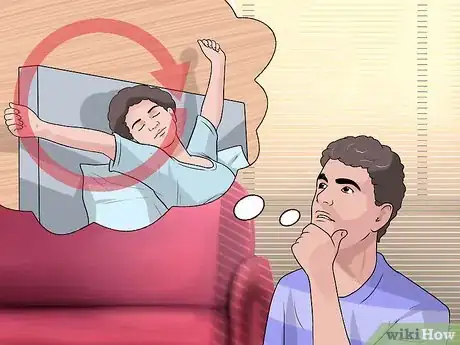


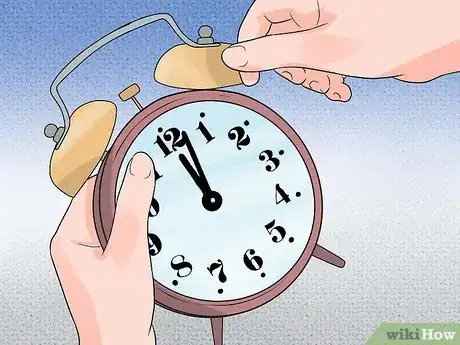

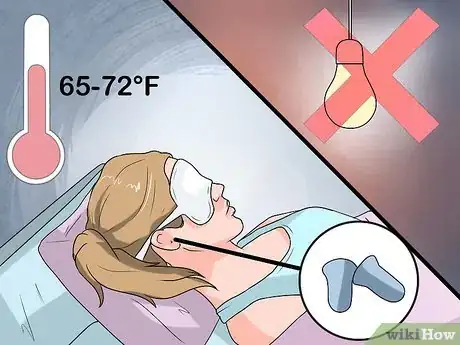

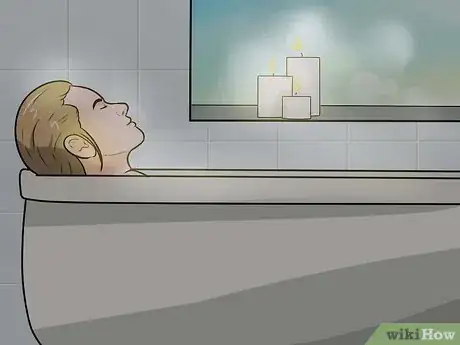




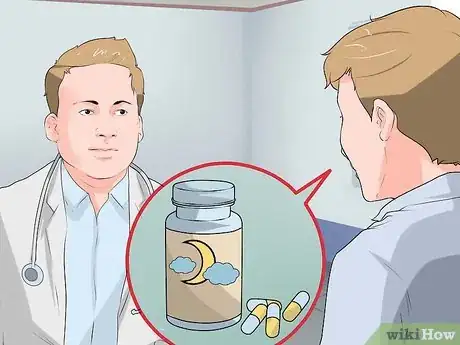



























































Medical Disclaimer
The content of this article is not intended to be a substitute for professional medical advice, examination, diagnosis, or treatment. You should always contact your doctor or other qualified healthcare professional before starting, changing, or stopping any kind of health treatment.
Read More...